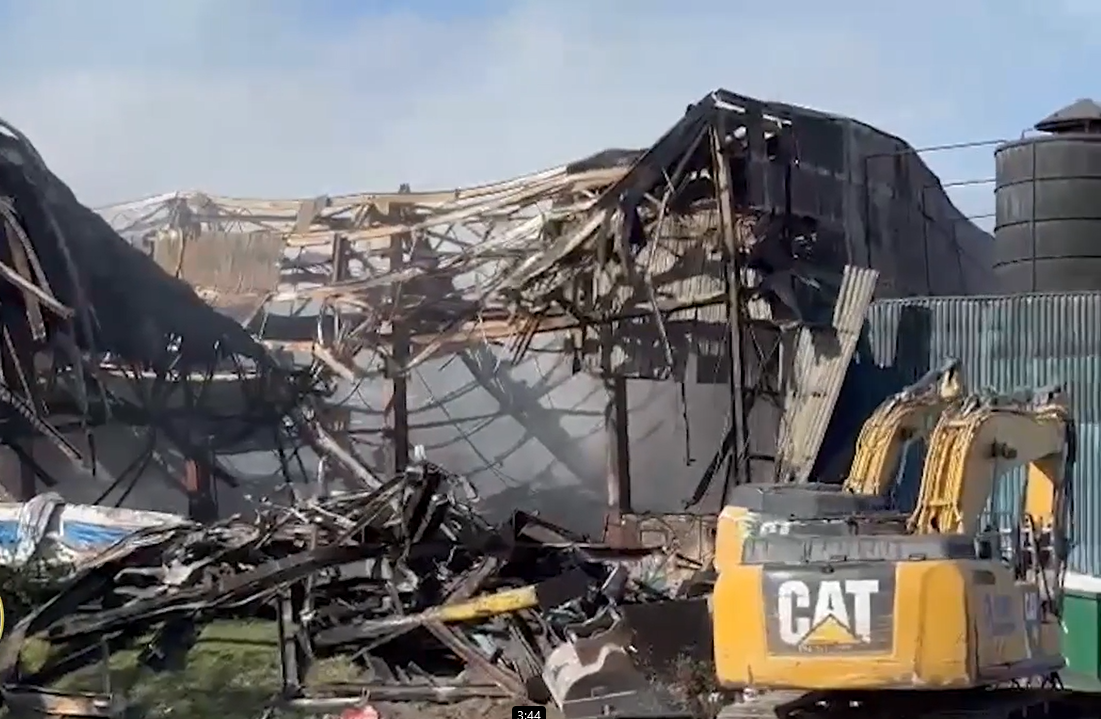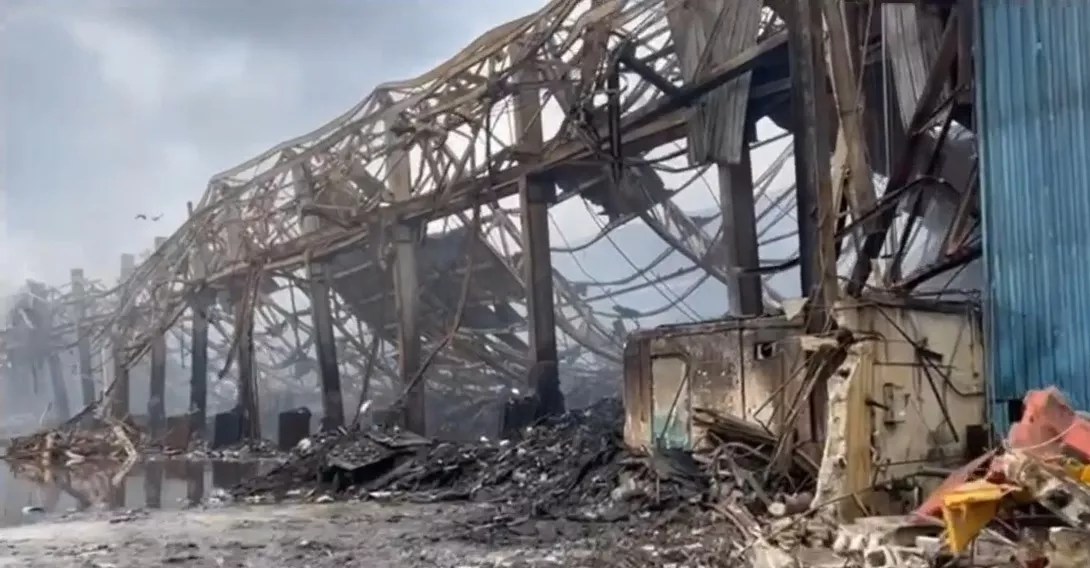
Screenshot from City of Doral fire footage

Audio By Carbonatix
A trash pit larger than a football field was ablaze inside a waste-to-energy plant in Doral last week. The fire reduced buildings at the site to charred ruins while firefighters struggled to navigate around collapsed roofing and 40-foot-high metal walls warped by the heat.
The smoldering pile of trash sent plumes of smoke around the Miami suburb of more than 75,000 residents, prompting municipal officials to close parks and advise those living near the plant to stay indoors and keep their windows tightly shut.
The disaster struck as plans for a new trash incinerator plant in Doral were already in motion. Last summer, the Miami-Dade Board of County Commissioners approved a resolution to build the new facility at the site of the existing plant, which industrial waste giant Covanta operates under contract with Miami-Dade.
Pushed forward by then-commission chairman Jose “Pepe” Diaz just before he left office under term-limit rules, the project would cost an estimated $1.4 billion and take nearly a decade to build.
Residents opposed to the new plant say that Diaz called for a vote on the measure at a July 2022 meeting with no advance notice to the public.
“This resolution and its language had not been seen by anyone until after Commissioner Diaz took this approximately five-second voice vote on one of the most important public health issues ever to come before the county,” the Doral Community Coalition states in a court challenge to the project.
Former coalition president Ivette Gonzalez Petkovich says the fire should serve as a wakeup call that the Doral area’s four-decade stint as the county’s trash incineration hub needs to come to an end. An attorney and erstwhile city council candidate, Gonzalez Petkovich has been helping the resident group fight the project.
“The smell has been the obvious complaint for many years. But I think the overarching issue is that a trash incinerating operation of this magnitude should not be so close to residents in such a densely populated city,” Gonzalez Petkovich tells New Times.
The now-wrecked residential trash plant, known as the Miami-Dade Resources Recovery Facility, was one of the oldest large-scale incineration operations in the nation. It processed more than 2,000 tons of garbage on average per day – roughly half of the county’s household rubbish – before the fire extinguished operations. Covanta says it won’t know if and when the plant can reopen until the fire is out and it can survey the damage.
Breaking Point
Gonzalez Petkovich says her family was dealing with the uncomfortable realities of living near a trash incineration plant long before the blaze made headlines nationwide. For years, the plant’s day-to-day operations caked neighborhood cars in ash and emitted a noisome odor that she says forced residents to stay indoors and left them questioning the health effects of breathing the fumes.
She says her nephew was once mortified when visiting members of a team in his soccer league called Doral “the trash city.”
Gonzalez Petkovich fears Covanta could use the fire as justification for expediting the new plant construction against the will of residents.
“My concern is that this disaster will in fact speed up intentions to build a new facility across the street from the current one,” she says.
The Doral Community Coalition has been imploring a Miami judge since September to axe the Miami-Dade commission’s approval of a new plant, on the grounds that Pepe Diaz’s abrupt vote on the measure violated state and county regulations.
At the July 2022 meeting, the commission was supposed to be reviewing a preliminary, county-funded report that evaluated multiple sites for the project – including one in Medley and two on Ingraham Highway. Residents had no notice that the commission was about to enter a vote to keep mass-scale incineration in Doral for another two decades at a minimum, the group claims.
In Gonzalez Petkovich’s view, the pre-emptive vote robbed Doral residents of the opportunity to be heard. “What was going on behind closed doors? How did everybody get on the same page on a billion-dollar project and not put an item on the agenda for it?”
The Doral Community Coalition argues that the vote violated a county rule that bars the commission from taking action “upon any matter when it is first presented to the commission in a report.”
Diaz said at the meeting, according to a Miami Herald report, “I respect other people who don’t want it there. But if we open that can of worms…then what happens to all of the other sites around Miami-Dade County where people just don’t want it in their backyards?”
The county acknowledged the plant was at the end of its lifespan in 2022. Instead of shuttering it, the commission renewed its contract with Covanta in October, approving a plan to perform a multiyear, $178 million refurbishment project and allow Covanta to continue running the facility until the new plant is built on the site.
An evaluation by county staff noted that in order to continue operations, the existing plant would require major repairs, including upgrades to its conveyor belts, trommels, electrical and control systems, and instrumentation.
Covanta would have received $59.7 million in base annual fees under the contract renewal, which is now in limbo because of the fire.
Gonzalez Petkovich tells New Times that the plant was dilapidated and should not have been allowed to plod on as a stopgap while the county searched for ways to deal with its ever-increasing volume of residential trash.
Despite its age, the facility was “pushed and pressed” for years on end, she says.
“It’s not a surprise that something like this would happen,” she says of the fire.

Screenshot from Miami-Dade Fire Rescue video
Since the blaze broke out on February 12, Doral Mayor Christi Fraga has advocated for moving trash incineration operations out of the city in the long term.
“Obviously, Doral’s position is we don’t want it in our community. We are advocating for that on behalf of our residents – for it to be moved,” Fraga said during a City of Doral video conference on February 18.
Doral native and former city mayor J.C. Bermudez won Diaz’s vacated seat and now represents the county commission district that includes the city, which might offer frustrated residents a better chance of nixing a new plant. While serving as mayor of Doral last year, Bermudez expressed disdain for the project and called it the product of a “hurried decision.”
During the February 18 video conference, Miami-Dade Mayor Daniella Levine Cava said the county is working on a long-term solution to handle its ballooning waste stream but did not have a viable alternative when the deadline to renew or cancel Covanta’s operating contract approached this past October.
“Problems of waste in our county are serious. We have limited landfill space and all of the garbage that had been going to this facility has now been going to the landfills [since the fire],” she said.
The county-funded report (attached below this story) notes that potential trash-facility locations west of Doral, closer to the Everglades, would raise concerns from environmental groups. The study found that the existing county-owned property in Doral would be the cheapest site on which to erect a new plant.
Levine Cava said the commission would have to take legislative action to overturn Diaz’s measure designating Doral as the site of the new project.
One resident said during the conference that he can’t stand the idea of the stench persisting.
“I live really close to the area, in the Landmark community. In the community, especially on Sundays – all the smells, the garbage – it was pretty much impossible to get out from our home,” he said. “I know the emergency now is to finish [off] the fire. But what about later?”
Florida: Garbage-Incineration Capital of the U.S.
The Miami-Dade Resources Recovery Facility opened on a 160-acre property on the edge of the east buffer zone of the Everglades in 1982, when the area was sparsely developed.
Over the years, the county’s westward residential expansion placed houses closer and closer to the plant. Now, luxury communities with million-dollar homes sit a few hundred feet from the facility – or what’s left of it.
According to a 2021 permit renewal application, the complex included four trash combusters that converted heat from incinerating garbage into steam to generate energy. Under normal operations, pollution control methods included a fabric filter, a spray dryer absorber for acidic gases, and activated carbon for heavy metals and dioxins.
The facility was permitted to collect and incinerate common residential garbage, everything from food waste to plastic containers to paper products to dirty diapers. Other trash sources such as old tires and construction materials were also permitted for burning, though there were regulated limits on the amount of nonresidential refuse the plant could process as a percentage of its total volume. (The facility did not incinerate bulk hazardous waste.)
New Jersey-based Covanta, which owns three dozen waste-to-energy plants scattered across the United States, maintains that its operations are a form of “reliable and sustainable waste management.”
In a challenge to the plant’s 2021 permit renewal, the environmental advocacy group Florida Rising begged to differ, claiming incinerators “are one of the most polluting sources of energy from start to finish.”
“Though the incineration industry claims that this energy is clean and renewable, incinerators are the most emission-intensive form of generating electricity in the U.S. today and can emit more air pollutants than coal plants per unit of energy,” the group argued.
Covanta declined to comment on questions about the fire when reached by New Times on February 16.
“We are still in the very early stages of this investigation and the focus at this time remains on containing the fire,” the company said. “Our priority is our employees and community. We are extremely grateful for the continued efforts of Miami-Dade County Fire Rescue and other emergency responders for their tireless work at the facility over the past several days.”
In May of 2021, Gov. Ron DeSantis signed a bill that provided for a state-funded financial grant program for waste-to-energy incineration. The law’s passage led industry news publication Waste Dive to declare that the Sunshine State had solidified “its status as the nation’s waste-to-energy capital.”
As of June 2022, Florida was home to ten waste-to-energy plants – more than any other state, according to Waste Dive.
While Florida appears to be embracing trash incineration, such facilities have been on the decline nationwide. The total number of U.S. commercial incinerators peaked at more than 180 in the early 1990s but fell to less than 80 by 2016.
If a new incineration facility were built in Miami-Dade, it would be one of only a handful of large-scale incinerators to be constructed in the U.S. in the past decade, according to the Energy Justice Network.